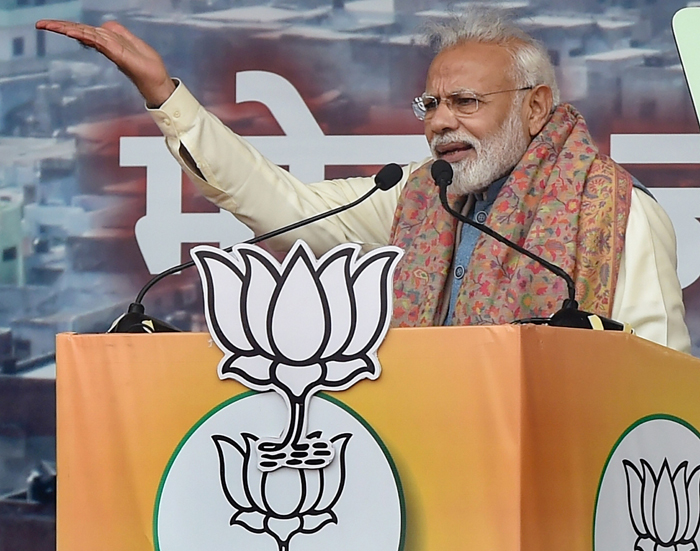India “is at risk of sliding into a second Emergency,” the Financial Times, which is an influential voice in the business world, has warned.
Commenting on the Citizenship (Amendment) Act, the paper said in an editorial “repressive tactics against protesters imperil core democratic rights”.
Unlike The Guardian, which takes a Left wing view of everything going on in India and has been a harsh critic of Narendra Modi right from the start, the FT is much more restrained in its reporting of India.
It is likely to influence British government and intelligentsia thinking on India, though the UK foreign office minister and Tory peer, Tariq Ahmad, said in a speech on Friday in London “we look to further strengthen the relationship between the United Kingdom and India”.
In its leader comment, the FT said: “At a party rally this year, Indian Prime Minister Narendra Modi talked of creating a naya Bharat, or ‘New India’. Many citizens are deeply worried about the direction this new India is taking.
“Protests have spread across the country in response to a citizenship law that discriminates against Muslims. The government’s response echoes the path Indira Gandhi took nearly 35 years ago, declaring a state of emergency. Mr Modi should reverse his position or risk vindicating his critics.”
It argued that the countrywide demonstrations “show that Indian citizens do care about secularism, despite the attempts of Modi’s Bharatiya Janata Party’s attempts to denigrate it. The citizenship law is only one manifestation of its Hindu nationalism.
“In August, it passed a law to revoke Jammu and Kashmir’s special status and statehood. Communications in what was formerly the country’s only Muslim-majority state are still limited today. The BJP plans to build a national citizenship registry, which would disqualify those without documentation. Coupled with the citizenship amendment, this could mean statelessness and potential detention for millions — many of them Muslims.”
It added: “The decision by some demonstrators to use violence is regrettable, strengthening the BJP’s narrative that its opponents are ‘anti-national’. Mr Modi has blamed opposition parties for ‘spreading violence’. Yogi Adityanath, Uttar Pradesh chief minister, has threatened to confiscate the property of those responsible for violence.”
It warned: “The government itself should recognise that putting pressure on civil liberties undermines its claims to be the world’s largest democracy. Banning the assembly of more than four people and attempting to shut down communications are not the hallmarks of a progressive society. Home affairs minister Amit Shah’s dismissal of the fast-expanding unrest as ‘some difficulties’ on the way to greatness grossly underestimates the gravity of the situation.”
The paper compared the present with India’s recent dark past: “There are parallels with the early stages of the Emergency of 1975 to 1977, during which the then Prime Minister Gandhi curtailed human rights, censored the press and imprisoned opponents in the name of national security. Mr Modi seems to be resorting to similar means to control opposition.
“De-escalation is not an obvious choice for the BJP, which seems to believe the ‘silent majority’ of voters support it. But stoking tensions risks a repeat of the sectarian violence for which Mr Modi was blamed when he was chief minister of Gujarat. Rescinding the law and ending restrictions on protests and speech are sensible steps which can stop conflict.”
The FT advised Modi to think again: “The will of India’s people to resist should not be underestimated. In 1977, Gandhi suffered a bruising defeat in elections she had thought that she would win handily. Forty years on, the cost to democracy from further efforts to end secularism and restrict citizens’ rights will be enduring. Mr Modi should turn back from the path of illiberal democracy before it is too late.”
For the time being, Boris Johnson’s government is not likely to make any comments on Kashmir or the CAA.
Tariq Ahmad, who is foreign office minister for the Commonwealth, UN and South Asia, spoke on Friday at the Guildhall, which was packed for a celebration of Guru Nanak’s 550th birth celebrations organised by the Indian High Commission.
Present at the gathering was V. Muraleedharan, India’s minister of state for external affairs, with whom Ahmad said he had held “wide ranging discussions on strengthening democracy, bilateral trade and human rights”.
Ahmad spoke pointedly of “the contribution of British Sikh men and women to British life, reflecting the true diversity and strength of the modern Britain that we all love”.
He said the new Parliament, with 65 MPs from the ethnic minorities — 22 Conservative, 41 Labour and 2 Liberal Democrats — “is the most diverse following the general election”.
He said the sacrifice of Sikhs in two world wars “should never ever be forgotten”, confirmed the government’s backing for “a Sikh war memorial right here in London”, and spoke of how the community was acting as a “living bridge” between the UK and India.
Ahmed, who is a respected figure in Indian circles, gave those present plenty of food for thought as he remarked at one point: “I speak as a Muslim that the values (of Guru Nanak) reflect not just those of the Sikh community but people of all faiths and beliefs around the world.”










